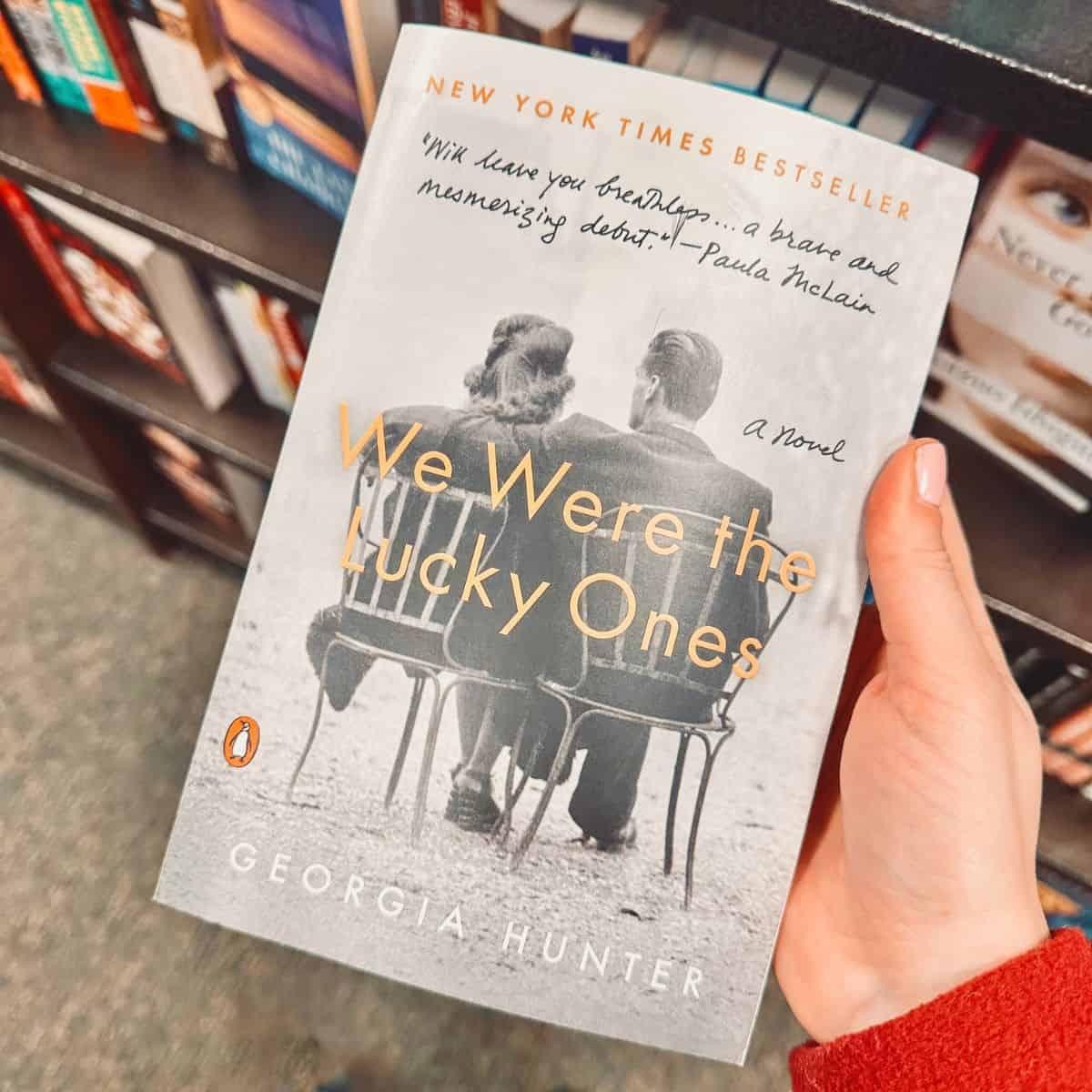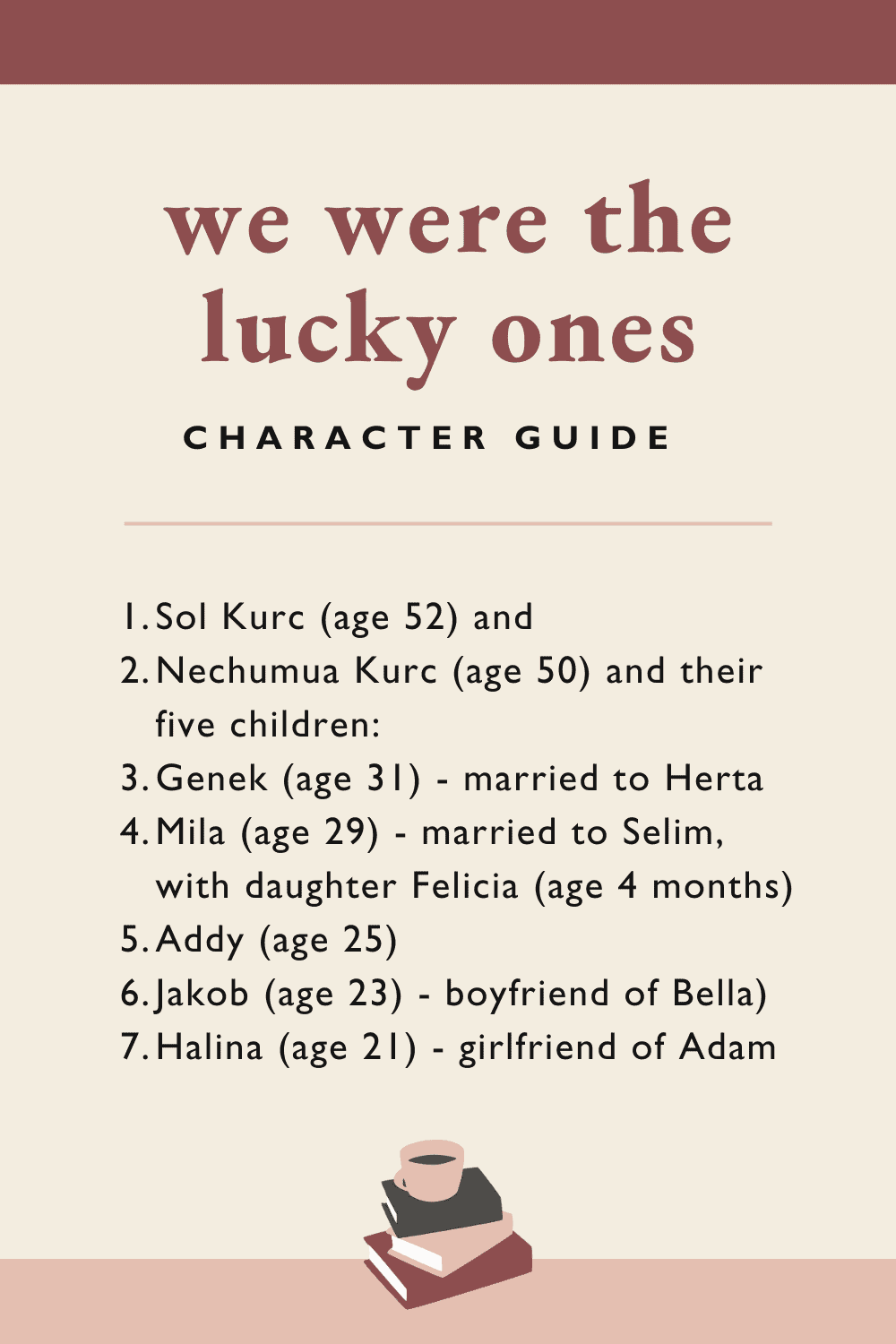This book review of We Were the Lucky Ones by Georgia Hunter gives you the details of this haunting World War II historical fiction based on a true story of the author’s ancestors.
It also refers to the family tree/cast of characters, which is really important for keeping track of this particular story. I have also provided some recommended book pairings for further learning.

Book Review of We Were the Lucky Ones
Survival and World War II don’t always go together, but that’s exactly what this New York Times bestselling We Were the Lucky Ones book is — a tale of who will be the “lucky ones” to suffer through but actually survive the atrocities of World War II. And the word “suffer” doesn’t seem worthy of what was experienced during this time. A true story can be stranger — and more horrifying — than fiction.
We Were the Lucky Ones is a top historical fiction book based on a true story about author Georgia Hunter’s ancestors and their survival during World War II.
We Were the Lucky Ones Characters
We Were the Lucky Ones characters include the Kurc family, Jews in Poland, beginning in 1939. Below is their family tree:
- Sol Kurc (age 52) and
- Nechumua Kurc (age 50) and their five children:
- Genek (age 31) – married to Herta
- Mila (age 29) – married to Selim, with a daughter Felicia (age four months)
- Addy (age 25)
- Jakob (age 23) – boyfriend of Bella
- Halina (age 21) – girlfriend of Adam

(Note: feel free to screenshot the above list. It’s very helpful, or even necessary, in keeping track of the We Were the Lucky Ones characters.)
The written copy also contains a We Were the Lucky Ones family tree, which I “dog-eared” and continually referenced, even though I flew through this true story in three days. I had tried the audio version, but it was too difficult to keep track of the many members of the Kurc family this way, so I recommend the hard copy or Kindle version.
Summary/Review of We Were the Lucky Ones Book with Quotes
The Kurcs gather for a family dinner so painstakingly unaware of their futures:
Months later, in a different world, Nechuma will look back on this evening, the last Passover when they were nearly all together, and wish with every cell in her body that she could relive it. She will remember the familiar smell of the gefilte, the chink of silver on porcelain, the taste of parsley, briny and bitter on her tongue. She will long for the touch of Felicia’s baby-soft skin, the weight of Jakob’s hand on hers beneath the table, the wine-induced warmth in the pit of her belly that begged her to believe that everything might actually turn out all right in the end. She will remember how happy Halina had looked at the piano after their meal, how they had danced together, how they all spoke of missing Addy, assuring each other that he’d be home soon. She will replay it all, over and over again, every beautiful moment of it, and savor it, like the last perfect klapsa pears of the season.
Early on in We Were the Lucky Ones, the reader learns that of the thousands of Jews in Poland prior to World War II, only a minuscule fraction survived. According to the true story, only 300 of the 30,000 Jews from Radom, home to the Kurc family, survived.
The War ensues and the story, based on the real lives of the author’s ancestors, follows the Kurc family through bombings, hidings, captures, imprisonments, and every other atrocity imaginable. The story succeeds at weaving in facts about the War, and what was happening in Poland as a whole at given times.
I left with a greater understanding of and appreciation for the country of Poland during World War II. The book also succeeded at conveying a sense of total awe for whom could survive what (I’ll leave it at that).
As unimaginable as it is to think of “what that must have been like” to suffer as Polish Jews in World War II, because this story happened during the technology of the 1940s, I was left with another unimaginable — what it must have been like to not speak to or hear from family members for years on end.
The story of Addy was the most captivating for me. A jazz musician in France in 1939 on a search for love and eager to share his gifts as he descends on a journey, he felt the most real and I could picture his music flowing through my ears.
I also felt especially connected to Sol and Nechuma’s daughter-in-law, Mila, and her young daughter, Felicia, who spend the first decade of her childhood in War. The stories of the many, many other family members who narrate this tale back and forth were difficult to follow, and I never felt like I got to know them or the details of their struggles.
There is beauty that remains in the true story of survivors, and it’s just as beautiful to hear what becomes of them. These stories were simply meant to be a book, and the author has served her family well.
Survival and World War II run deep in my own family as well. My maternal grandfather survived the Pearl Harbor attack by hiding in a tree, and my paternal grandfather survived the bloody battle on the beaches of Normandy. My husband’s maternal grandfather, an Air Force pilot, was the lone survivor of five brothers fighting in World War II. His history is that of Saving Private Ryan — except no one attempted to save his grandfather and return him home to his war-torn family. The survivors and the victims of World War II hold stories we cannot fathom, and they deserve our respect and gratitude.
The We Were the Lucky Ones book is consistently highly rated, and I would recommend the written version to those who yearn for deep reading, true stories, and more information about World War II.
Book Pairings
For more like this We Were the Lucky Ones review:
- Explore author Georgia Hunter’s website for more background information and family pictures.
- Check out more of the best World War II books.
- Watch a World War II-themed movie.
- Explore your own Ancestry, particularly during that time period.
Conclusion
I hope this book review of We Were the Lucky Ones by Georgia Hunter inspires you to pick up this important book and/or continue to learn more about World War II.
Buy We Were The Lucky Ones:


I’m reading this book now and I love it! It puts real people in the names and places I had only read about. It helped me understand the war because she paralleled the Kurc family activities with the movement of Hitler and his army. It has helped me to use an Atlas as I read. Thanks for the review!